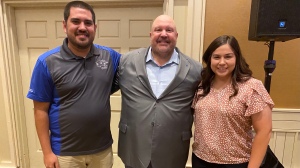Define Your Own Self Worth

It is important to take care of ourselves and not let the actions of others define our self-worth. The awesome band From Ashes To New has a new song, “Hope Your Happy.” I heard an interview with the band on Serius XM Octane where a band member discussed that the song was about that person who continually stabs us in the back (figuratively of course), demeans or puts us down, or wants to change us, and then wants us to thank and praise them for it. At first, I thought, “Wow, how terrible is that!” Then in reflecting I realized I had experienced a leader, scratch that – let’s call the person a non-leader, like this. When the person was not around everyone would discuss how the person was causing misery. Then when the person was around, everyone would sing a happy song. In the song it says “Should I sing you a happy song?” I guess everyone felt they had to.
This non-leader was always trying to change people and get them to conform. And then expected praise and gratitude for it. As the lyrics say, “And act like I should thank you for the suffering; It’s killing me inside; I’m tired of being someone else; Let me be myself.” The subject matter of this song is clearly not happy, but the situation is real in relationships and the workplace. We need to, at the very least, establish personal and professional boundaries to protect ourselves from people like this. This may involve limiting interactions, in my case with the non-leader, or person, setting clear expectations for how you should be treated, and maintaining a healthy work-life balance. We need to also take an introspective look at ourselves to make sure we are not exhibiting any of these behaviors in our personal or professional lives.
Go Ahead And Love Yourself

The great band Beartooth has an awesome new album coming out entitled, The Surface. One of the songs on the album they have released already is “Might Love Myself” and is incredible. In a press release about the album, Beartooth’s Caleb Shomo said, “This album is the story of my beginnings in the new world I’ve created for myself. One focused on health, self love, positivity, understanding, hard work, and most of all second chances. At the end of the day, life is short for all of us. We can’t escape the end, so why not make friends with it and live in a world focused on living a personally fulfilling life.” In fact I just blogged about our need to prioritize our own needs, desires, and interests in Selfish Or Self-Centered. I believe C. S. Lewis would have greatly appreciated the lyrics of this song. I know I do!
In “Might Love Myself,” Caleb sings, “I’m exactly who I wanna be.” That is a great place to be. Loving ourself means having a deep appreciation and acceptance for who we are as an individual. It involves recognizing our worth, embracing our strengths and weaknesses, and treating ourselves with kindness and compassion. It also means prioritizing self-care – our own well-being. Loving ourselves involves us taking care of our physical, emotional, and mental health. Ultimately, to love myself means believing in my own values and my deserving of happiness and fulfillment. Do you love yourself?
The Push & Pull Of Collaboration

On Friday I heard Tom Morello’s Radio Comandante Show on SiriusXM Octane. If you like hard rock music like me, you will know who he is. If you don’t, you should check him out. He has had multiple Grammy nominations and wins. Also, he has a BA in political science from Harvard University. I really want to hang out with him someday – I’ll bet we could have an awesome discussion on leadership and education. On his show on Friday, Tom said, “I love collaborations with other great artists because it pushes and pulls me in different directions.” He was expressing his tremendous enthusiasm for working with talented individuals and bands. I believe he enjoys the dynamic nature of collaborating with others, as it challenges him creatively and allows for a wider range of ideas and perspectives.
I loved that he called out collaborations because this showed his appreciation for the diversity of input and the growth that can come from being influenced by other artists’ unique styles and approaches. We all need these collaborations. I just got asked to chair/facilitate a big event in Berlin, Germany in November that will involve leadership from companies in several different countries. I love working for this convener because it becomes a collaboration where I get pushed and pulled to learn so many new things – not to mention all the great people I get to meet and collaborate with from around the world. We need to seek out and embrace being pushed and pulled to grow.
Of collaborations, Morello also said it, “Forces me to try things I wouldn’t otherwise try.” This was a great point to hammer home how collaborating with others can stretch us in ways we never imagined. We use stretch lessons in education to take our students learning to new heights and we need to embrace this as adults as well. Let’s all take a page from Tom’s playbook and step up our collaboration game.
Making Friends With All Our Demons

Every time I hear the song Deep End by the great band I Prevail I ponder on the chorus where it says, “So I made friends with all my demons.” I would like to think that by embracing, accepting, and coming to grips with all aspects of ourselves, even the ones that may be considered negative or problematic we can potentially learn from them. By becoming friends with our demons we can find resolution, and ultimately become a more balanced and self-aware individual.
By acknowledging and befriending our insecurities, flaws, and past mistakes in order to grow and develop as a person, we can stay out of the deep end. If we know those demons are there we can begin to look beyond them, not let them get in our way. Our demons, whatever they may be, are many times blocking the thing we really want to see. Many times the very thing we want to create is blocked by the anxiety of not creating, the fear of not making it, or the doubt that we’re not good enough. So maybe the next time some demon comes creeping in we give it a fist-bump, acknowledge it, and then remind ourselves we are worthy and show ourself the compassion needed to move on and do the great things we are capable of.
Selfish Or Self-Centered

As C. S. Lewis put it in Surprised By Joy: The Shape Of My Early Life, “The distinction is not unimportant.” He was referring to the distinction between being selfish or being self-centered. He preferred being selfish over self-centered. In fact I believe he was really on to what we now talk about being self care. Being selfish and being self-centered are not interchangeable. Lewis discussed that to find joy we need to have some selfishness. We need to prioritize our own needs, desires, and interests. These are the things I talk about when discussing self-care. This includes setting up the boundaries in a working relationship. The self-centered leader wants us to give up our personal priorities to make themselves look good. Is it selfish to not take emails after 5:00? Probably, but probably good for your well-being and your family’s well-being. Does it mean you are selfish if you may have to give up some of the above and beyond things you do as a great school principal during the next year to spend time finishing your dissertation for your PhD? Yes, but there is no way that milestone in your life will be met otherwise. These are completely acceptable forms of selfishness.

Conversely, being self-centered means having an excessive focus on oneself, often accompanied by a lack of interest or concern for others. This is the person that always needs to be in the limelight. It involves being preoccupied with one’s own thoughts, concerns, and desires, disregarding the needs and perspectives of others. Lewis explained that the self-centered person can never find joy. A self-centered person wants to hear about themselves. This person will constantly steer conversations towards themselves or dominate social situations without regard for others’ interests or feelings. The self-centered person is also unwilling to share or compromise.
I’m glad that in Surprised By Joy: The Shape Of My Early Life C. S. Lewis caused me to contemplate this difference between being selfish and being self-centered. The selfish person can have a healthy focus on himself versus the self-centered person’s complete disregard for others’ well-being and perspectives. This distinction is not unimportant. We must care for ourselves and make sure we are prioritizing our own needs and desires.
Being Curious Not Judgmental

I loved hearing one person tell another yesterday, “I’m being curious not judgmental.” I loved that because it means that the person saying that is expressing interest in understanding or learning more about something, without passing any negative or critical judgments. The individual was approaching the situation with an open mind and a genuine desire to gain knowledge or information, rather than making assumptions or forming opinions based on preconceived notions.
Curiosity invites us to ask questions, explore new ideas, and engage in meaningful conversations. By embracing curiosity, we create a culture of continuous growth and development, both individually and as a society. Honing our curiosity allows us to challenge our own assumptions and biases. When we are curious, we actively seek out different viewpoints and opinions, even if they differ from our own. This helps us overcome stereotypes and preconceived notions, promoting inclusivity and reducing discrimination. If we can approach others with curiosity, we show genuine interest in understanding their perspectives, experiences, and beliefs. This fosters empathy and enhances our ability to relate to others.
Watch Out For Getting Our Tongue Into Our Cheek

In his essay, “On Three Ways of Writing for Children,” Of Other Worlds in the book On Writing (and Writers), C. S. Lewis spoke of a complement an author had gotten. He said, his tongue “never once got into his cheek” (p. 79). He was pointing outhe author didn’t use sarcasm or irony in their writing. Their words were sincere and straightforward, without any hidden meanings or humor.

When speaking about writing for children he he said, But only such good as involves treating them with respect. We must not imagine that we are Providence or Destiny p. 80). I believe I this holds true for all ages. Sometimes when we try to use sarcasm whether in writing or in-person oratory it can be taken wrong. I am not one that prescribed to no humor or sarcasm, as anyone who knows me will attest. But I do know we have to watch that. One, in-person we must know our audience. When in-person with a group we know well or have a relationship with, it can be effective. In written works where we can only predict who our audience will be we have to be very careful – it can be taken wrongly and not even in the context we mean it. This also holds true for groups we are in-person with. I know I have to really watch this and wanted to share.
Love In Leadership

Loving those we serve is an important part of leadership because it creates a positive and supportive environment. If we genuinely care about the well-being of our team members, this love fosters trust, collaboration, and motivation. It’s more than having people feel valued and appreciated; it’s about their leaders truly having their best interests at heart and acting on their behalf. First, this love in leadership is the right thing to do for others. Second, this love leads to higher job satisfaction, increased productivity, and stronger loyalty towards the organization. Finally, love in leadership helps build strong relationships and enables leaders to better understand and meet the needs of their team members.
Yesterday at a reception I was attending in Tucson, Arizona I told a table of full of teachers, “thanks for being so engaged during sessions I had done during the day.” Then after we had chatted for a bit and I was getting ready to move along to chat with others, I told them that I loved them. One in the group was impressed with my use of love. We then got into a discussion of what “love” means in the context I was using it in. I love, pun intended, having that discussion because I believe we must love others. It means we are practicing both the golden rule and the platinum rule. So, how do we really provide love for others?
A friend of mine Dr. Lindan Hill shared Ashley Montague‘s definition of love, “Profound involvement in the well-being of others,” with me. Dr. Hill and I have had many a discussion about this and we are both very committed to loving those we serve. I believe Montague’s definition refers to a deep and genuine concern for the welfare and happiness of other people. It suggests that love goes beyond superficial feelings or attachment and is a genuine desire and commitment to support and care for others. This love is selfless. I want to emphasize here the active engagement that love entails, rather than simply a passive affection or attraction. Ultimately, loving those we serve allows for effective and compassionate leadership that brings out the best in everyone involved.
Testing Our Beliefs

In A Grief Observed, C. S. Lewis said, “Only a real risk tests the reality of a belief.” This really jumped off the page at me. Lewis used the metaphor of easily believing a rope could support and save you until you actually needed the rope to support your weight – then doubt sets in. This was a reminder to me that in order to truly understand the validity or truthfulness of a belief, one must be willing to take risks and put that belief to the test. It suggests that simply believing something without any real-world experience or evidence is not enough to determine its truth. Only by facing the consequences of a belief can we truly evaluate the reality or accuracy of a belief.

Another thing I learned from Lewis in this book is that it is okay to question our beliefs. Ultimately, this can make our beliefs stronger. Lewis’ questioning of his own faith and beliefs at the time of losing his wife did not mean he was going to change his beliefs. This curiosity about our own beliefs can be healthy in helping us understand how we came to have a certain belief. It can also help us to understand others’ beliefs. By educating ourselves on issues we can better understand our our beliefs and the origins of those beliefs.
Learning Compassionate Accountability
Compassionate Accountability: How Leaders Build Connection and Get Results by Nate Regier
My rating: 5 of 5 stars
In the leadership development work I do, we talk about empathy not being enough. For empathy to work there must be action. That action is compassion. In this book we learn that compassion is a leadership skill we can learn and improve. Most importantly, we learn, “compassion without accountability gets you nowhere, and accountability without compassion gets you alienated.” This book gives us a plan for honing our skills in compassionate accountability.
View all my reviews

leave a comment